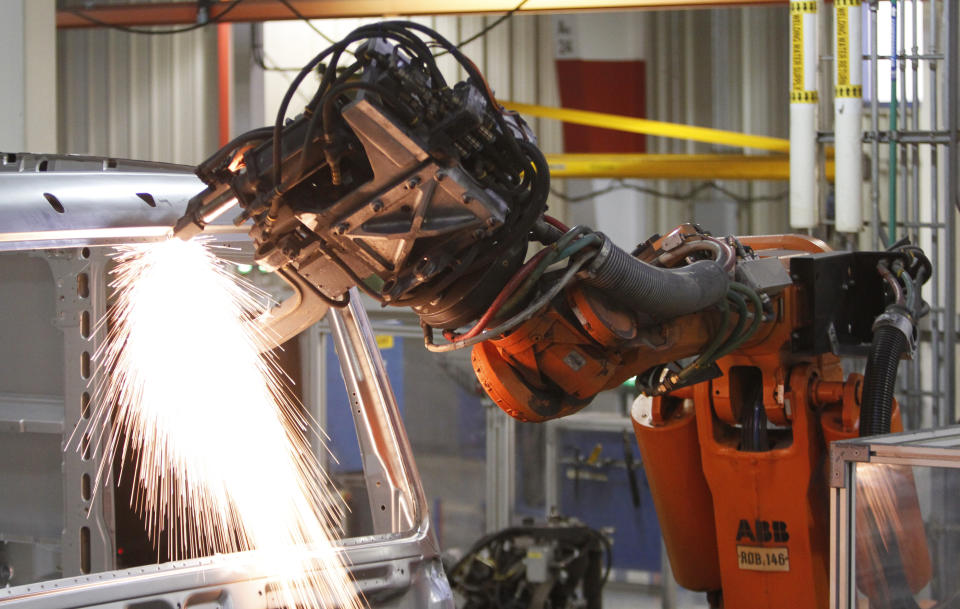The biggest problem with robots taking jobs may not be unemployment—yet

Automation is changing the economy and workforce – and significantly. Due to robots, computers and better technology, it takes far fewer workers to get the same amount of economic output.
The data are clear: Manufacturing output in the US has never been higher, and yet the number of people employed in that sector has fallen dramatically since 2000. Similarly, retail sales have skyrocketed thanks to Amazon and other e-commerce companies while retail employment stagnates and store closings ramp up.
And more is likely to come: Self-driving cars no longer live in the imagination, but out on the roads of northern California.
However, employment data don’t appear to be showing significant overall changes stemming from rapid technological advancement that has cost industrial jobs, according to a recent research note.
“If the disruption from labor-replacing technologies was indeed accelerating, one would expect rises in the unemployment rate and labor productivity growth [per human],” Goldman Sachs (GS) noted in a recent report. “But the unemployment rate is now only 4.4% and measured recent productivity growth has been very weak.”
But losses are happening. E-commerce requires just 0.9 employees per million dollars of sales, versus the 3.5 of brick-and-mortar stores, and this has already shrunk employment about 100,000 per year. Goldman estimates that self-driving cars will likely cost 300,000 jobs—but in 25 years. According to the report, however, this displacement is being taken up by jobs in the healthcare, IT, and food industries, which is why unemployment hasn’t been this low since 2007.
Another factor against automation the workforce: Though productivity per employee is as high as it’s ever been, this growth in production hasn’t sped up—it has actually decelerated over the past 20 years, plateauing somewhat.
Underemployment may be the problem, not unemployment
Despite the low unemployment rate, there is reason to anticipate automation’s imminent impact on jobs.
Banks have begun to cut tellers and close branches, but only a fraction of the layoffs and closings planned have occurred yet. Truck drivers and taxi drivers have not yet been replaced, Amazon hasn’t completely strangled physical stores, and fast food restaurants have not yet swapped out workers with machines. In other words, there is a lot up in the air.
Still, pure technological unemployment also may be a distraction from a larger issue. A recent report by the Boston Globe that elaborated on a US Census study on older millennials described the demographic in stark terms. Middle-class blue-collar jobs have been disappearing and low-wage service jobs have filled the gaps. Some workers even fall out the bottom of the ladder. The Census study that found 1 in 4 men aged 25 to 34 living at home are neither employed nor studying. A lack of tertiary education — professional, college, vocational — is an increasingly large divider between success and hardship in this new economy.
This jives with Goldman’s reading of the future, and not in a good way. Healthcare, IT systems, and food service jobs may be strong industries, but only food service may be viable for some job seekers given the training required.
The Federal Reserve sees this as a major problem, and Chair Janet Yellen has noted the need for more educational opportunities for people with lower incomes. A large Fed survey published this month noted severe headwinds faced by these workers, including unpredictable schedules, limited hours, and not much in the way of employee benefits. For today at least, the major issue around automation and technological change to work may be how good the jobs are, not whether they exist.
Ethan Wolff-Mann is a writer at Yahoo Finance focusing on consumer issues, tech, and personal finance. Follow him on Twitter @ewolffmann. Got a tip? Send it to [email protected].
Read more:
Airlines are giving crews leeway to hand out money when necessary
Banks take just 90 seconds to approve a credit card. Here’s what they look for.
Uber’s new tipping dilemma: low prices or smooth experience
Zuckerberg at Facebook conference: if you take one thing away—this is it
The cost of unifying North and South Korea
The trick to getting credit card fees waived? Just ask
Chase’s Sapphire Reserve is very worth it, even with its slashed bonus